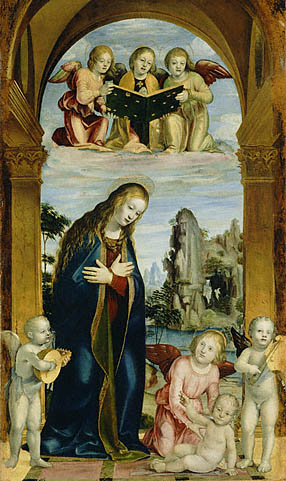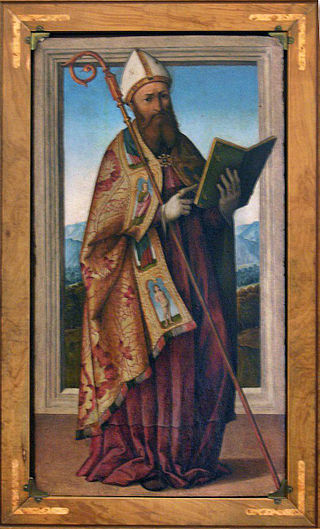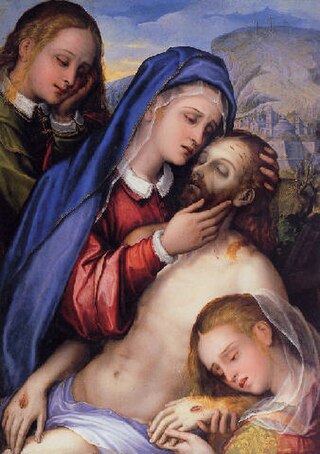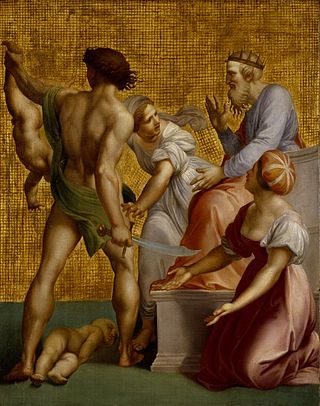Related Research Articles

BernardoZenale was an Italian painter and architect.

The Accademia di Belle Arti di Venezia is a public tertiary academy of art in Venice, Italy.

Giovanni Battista Zelotti was an Italian painter of the late Renaissance, active in Venice and her mainland territories.

Paolo Porpora (1617–1673) was an Italian painter of the late-Baroque, who was active mainly in Naples and specialized in floral still lifes. He is documented as a pupil of Giacomo Recco, the father of Giuseppe Recco, and said to have worked under Aniello Falcone. He joined the Roman Accademia di San Luca from 1656 to 1658. He appears to have been influenced in Rome by Netherlandish still-life painters. Among his pupils were Giovan Battista Ruoppolo and the Neapolitan Onofrio Loth.

Girolamo Marchesi was an Italian painter of the Renaissance period.

Giovanni Bernardo Lama (1508–1579) was an Italian painter of the Renaissance period, active mainly in Naples. He was the son of a generally unknown artist, Matteo Lama. He was the apprentice of Giovanni Antonio D’Amato, then Polidoro da Caravaggio who had fled Rome after the Sack of 1527. He worked in the style of his friend and contemporary Andrea di Salerno. A Madonna and child with saints is in the sacristy of San Luca Evangelista in Praiano. A Deposition from the Cross is found in the Royal Basilica of San Giacomo Spagnoli in Naples.

Giovanni Battista Merano (1632–1698) was an Italian painter of the Baroque period, mainly active in Genoa.
Giuseppe Alabardi was an Italian painter, active in Venice around the year 1600. Some works in the Oratory of San Nicola da Tolentino in Vicenza are attributed him. He painted architectural landscapes and quadratura and is recorded as having painted scenery for productions of operas in Venice.

Giuseppe Cades was an Italian sculptor, painter, and engraver.

Francesco da Cotignola, also called Zaganelli, was an Italian painter of the Renaissance period, active mainly in Parma and Ravenna.
Bernardino Lanzani was an Italian painter of the Renaissance, active mainly in Pavia and Bobbio.
Giacomo Coltrini was an Italian painter, active mainly in a Renaissance style in Brescia, and a military engineer for Venetian Republic. He painted frescoes for the subterranean church of San Faustino Maggiore in Brescia. He died as a military engineer in Candia. Titian's paternal uncle, Gregorio Vecelli, lived in Coltrini's house in Venice.
Francesco Comande was an Italian painter of a Renaissance style, born and active in Messina, Sicily.
Francesco Comi, also known as il Muto da Verona or il Fornaretto, was an Italian painter of the Baroque Period. He was a pupil of Giovanni Gioseffo dal Sole. He was deaf and was active mainly in Verona.
Giovanni Malagoli was an Italian painter, depicting landscapes, genre, and still lifes of fruits and flowers.
Cesare da Conegliano was an Italian painter, known from a single work in Santi Apostoli, Venice.

Bernardino Zaganelli, also Bernardino di Bosio Zaganelli and Bernardino da Cotignola, was an Italian painter, of the Renaissance period.
Carlo Natali, also known as il Guardolino, was an Italian painter of the Baroque period, active in Cremona and Bologna
Leonardo Da Besozzo or Leonardo Dei Molinari was an Italian painter, active in Lombardy and Naples.

Lello da Orvieto was an Italian painter and mosaicist, active in Naples and Lazio between 1315 and 1340.
References
- ↑ Garollo, Gottardo (1907). Ulrico Hoepli (ed.). Dizionario biografico universale. Editore Libraio della Real Casa, Milan. p. 568.
- ↑ Boni, Filippo de' (1852). Biografia degli artisti ovvero dizionario della vita e delle opere dei pittori, degli scultori, degli intagliatori, dei tipografi e dei musici di ogni nazione che fiorirono da'tempi più remoti sino á nostri giorni. Seconda Edizione.. Venice; Googlebooks: Presso Andrea Santini e Figlio. p. 242.